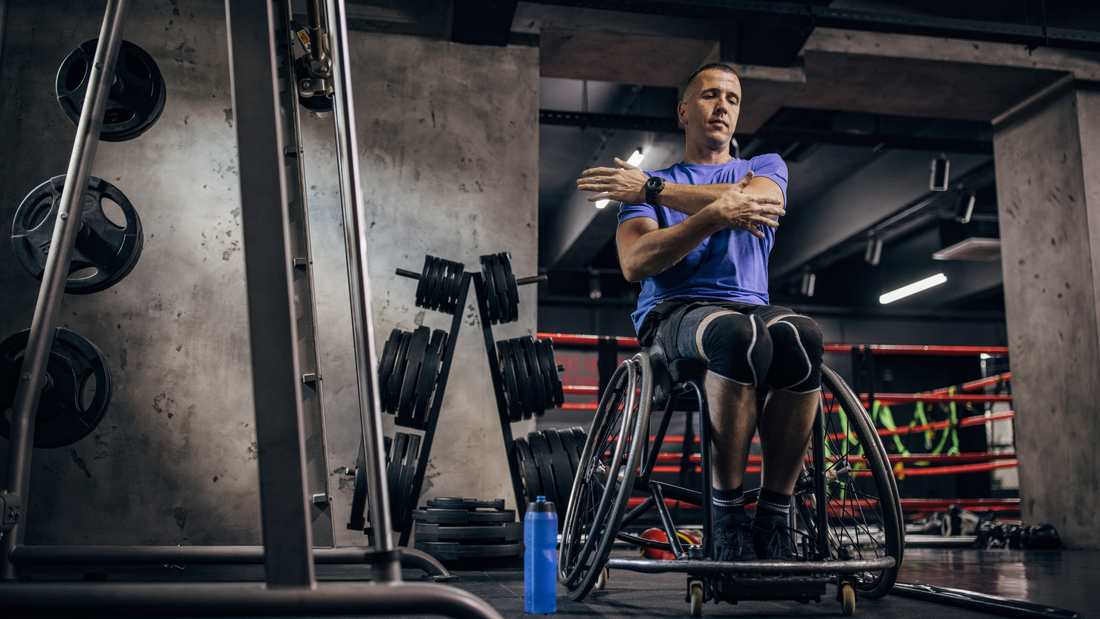|
Getting in shape and maintaining physical fitness are integral parts of a healthy lifestyle for everyone, even people with developmental disabilities. However, differently-abled individuals often feel that getting started on a new exercise routine is challenging, especially when most exercise regimes aren’t made for people with diverse abilities.
Regular exercise can enhance cognitive abilities, reduce the risk of disease, and improve your ability to move independently. If you or a loved one has a developmental disability and feels ready to get fit, we’ll show you how to get started! What Are Developmental Disabilities? “Developmental disability” is a broad term used to describe conditions that impact a person’s physical and mental functioning. When a person’s physical or mental limitations become apparent in childhood, they are considered developmental disabilities. In some cases, developmental disabilities may not be recognizable until age three. Once these symptoms appear, they will be present for the rest of a person’s life. A few examples of developmental disabilities include autism spectrum disorder, cerebral palsy, and Down syndrome. The Characteristics of Developmental Disabilities Every child develops at their own pace, but children with developmental disabilities may take much longer to meet developmental milestones relating to speech, motor, and social skills. They may also exhibit behavioral symptoms, such as emotional outbursts or a lack of response to external stimuli. Signs of developmental disabilities may include:
If a loved one is exhibiting signs of developmental disabilities, seek a proper diagnosis from a licensed healthcare professional. What Causes Developmental Disabilities? Some developmental disabilities are purely genetic, so symptoms can arise even when the parents are healthy. However, all of these developmental disabilities are related to the nervous system and brain development. A few known causes of developmental disabilities include:
The direct cause of developmental disabilities is not always known, but these disabilities are almost always related to the brain developing abnormally. The good news is that with proper care, people with developmental disabilities can manage their symptoms and live healthy, happy lives. Why Should Someone with Developmental Disabilities Exercise? According to the Centers for Disease Control and Prevention (CDC), individuals with developmental disabilities are more likely to have obesity, heart disease, stroke, diabetes, or develop cancer compared to those without disabilities. Regular physical activity can help people with developmental disabilities manage their conditions and reduce the risk of developing more health problems. Additionally, exercising can be a great way for people with developmental disabilities to form social connections with new people. 5 Exercises for Individuals with Developmental Disabilities These fun exercises will help differently-abled people improve their fitness and have fun along the way. Keep in mind that it’s essential for those with developmental disabilities to consult a licensed healthcare provider before beginning a new exercise regime. But once you have the green light, these exercises can help you or your loved ones get in the best shape of your life! 1. Adaptive Sports Adaptive sports are an excellent way for people with developmental disabilities to get active. Adaptive sports are just like regular sports, except they include a few modifications so that people with developmental disabilities can also participate. Some of the best adaptive sports include:
These activities help differently-abled individuals improve their cardiovascular health and physical strength while getting in shape with people who are just like them. 2. Adaptive Yoga In most yoga classes, people seem to bend themselves in a series of pretzel-like poses, but this exercise is actually about so much more than that. Yoga is a full-body practice that uses physical activity and meditative breathing to promote relaxation. And with adaptive yoga, even people with developmental disabilities can reap its benefits. Adaptive yoga uses blankets, straps, and chairs to make yoga more accessible to people with developmental disabilities. This allows differently-abled people to develop flexibility and improve motor skills. 3. Dance Anybody can dance, including people with developmental disabilities. Dance is a powerful form of self-expression with profound mental, physical, and emotional benefits. Since emotions are stored in the body, dance therapy is a wonderful way for people with developmental disabilities to express their emotions. Not only does dance improve physical fitness, but it also creates a sense of autonomy that people with developmental disabilities may not experience in other aspects of their lives. Meanwhile, differently-abled people can also experience the benefits of improved sensorimotor integration through dance. 4. Aquatic Therapy Aquatic therapy is one especially beneficial form of exercise for people with developmental disabilities. This is because the water mitigates the effects of gravity on the body, thereby reducing strain on the joints and muscles. A few of the best aquatic therapy exercises include:
Aquatic therapy increases joint flexibility, muscle strength, and balance while reducing physical pain that might otherwise discourage some differently-abled athletes. 5. Group Fitness Nobody wants to feel limited by their physical or mental abilities, but sometimes, people with developmental disabilities feel left out of social interactions with others. However, group fitness classes made especially for people with developmental disabilities are a great way to get in shape and socialize with like-minded people. Group fitness classes create a safe space where people with developmental disabilities can get in shape with friends! And the best part is, with online workout classes at Let’s Go fitness, you can get started on an adaptive group fitness regime in the comfort of your own home. Get in Shape with Let’s Go Fitness At Let's Go Fitness, we strive to create a welcoming environment where anyone can make friends, get in shape, and have fun doing it! Our adaptive fitness specialists guide participants every step of the way. Whether our athletes need accommodations, modifications, or simply an understanding listener, we'll help everyone reach their goals. Are you ready to start a fitness journey for yourself or a loved one? Contact Let's Go Fitness today to learn more about our membership packages!
0 Comments
Leave a Reply. |
ABOUTLet's Go Fitness's blog page keeps you up to date with educational and instructional information for training with diverse abilities. Archives
June 2023
Categories |
Let's Go Fitness
© 2020 Let's Go Fitness is an online fitness platform for people of all abilities.


 RSS Feed
RSS Feed